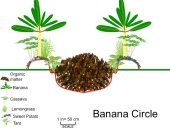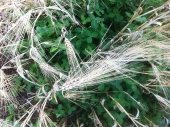




 1
1




My Blog, Natural History and Forest Gardening
www.dzonoquaswhistle.blogspot.com
"Listen everybody, to what I gotta say, there's hope for tomorrow, if we wake up today!" Ted Nugent
"Suck Marrow" Henry D Thoreau
 1
1




Idle dreamer
 1
1




Brenda
Bloom where you are planted.
http://restfultrailsfoodforestgarden.blogspot.com/
 1
1




There is nothing permanent in a culture dependent on such temporaries as civilization.
www.feralfarmagroforestry.com












Brenda
Bloom where you are planted.
http://restfultrailsfoodforestgarden.blogspot.com/




 1
1




Idle dreamer






Is planting trees all you do?
No, planting trees is just one part of an integrated program of sustainable development. Tree planting is a high priority because it is the simplest form of sustainable development there is, restoring productivity to the land, and giving the rural poor a sustainable means to provide for themselves. Restoring the natural environment also influences the quality of life in a variety of ways—providing clean water, for example.
There are many other things we do besides plant trees. For example, we provide small business loans or “microcredit" to the farmers we work with. Through microcredit, we help farmers start other businesses so that they can decrease their dependence on the land and the community as a whole can diversify its economy. Over the years, we have financed dozens of businesses from mechanic shops and bakeries to beauty shops and tailors.
As our focus shifts from the sustainable development of families to the sustainable development of entire villages, the community takes over and Plant With Purpose takes on more of an advisory role. This is where things really get exciting as families start to work together to improve local infrastructure, and invest in and protect the natural resources of their community. Our greatest reward is a community that doesn’t need us anymore.
Since 1984, we have helped more than 100,000 people in some 230 villages lift themselves out of poverty. We have transformed tens of thousands of lives, empowering communities to take charge of and solve their own problems. And it all starts with planting trees.




 1
1
































Emerson White wrote:
Additionally some parts of Africa never really had agriculture and they must be taught for the first time
Idle dreamer








Idle dreamer








Emerson White wrote:Maybe, there is a reason people with agriculture tended to live so much longer despite the higher population densities and diseases that were associated with them.
Emerson White wrote:the truth of the matter is that hunters move into an area and drive everything they can easily catch and eat to extinction...Tragedy of the commons and all that jazz.
"the qualities of these bacteria, like the heat of the sun, electricity, or the qualities of metals, are part of the storehouse of knowledge of all men. They are manifestations of the laws of nature, free to all men and reserved exclusively to none." SCOTUS, Funk Bros. Seed Co. v. Kale Inoculant Co.








Idle dreamer








Emerson White wrote:
Infantacide is a cause of death for a people who haven't got a stable and bountiful food source.
Idle dreamer









Brenda
Bloom where you are planted.
http://restfultrailsfoodforestgarden.blogspot.com/




 Mostly I hope to make people aware of different ideas and ways of doing things - I can't change their minds or make them do things "my way"!
Mostly I hope to make people aware of different ideas and ways of doing things - I can't change their minds or make them do things "my way"! Idle dreamer
 1
1




There is nothing permanent in a culture dependent on such temporaries as civilization.
www.feralfarmagroforestry.com









|
Roses are red, violets are blue. Some poems rhyme and some don't. And some poems are a tiny ad.
Learn Permaculture through a little hard work
https://wheaton-labs.com/bootcamp
|





